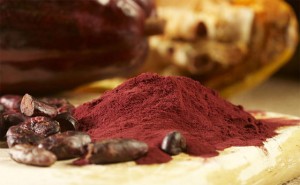 It’s all about cocoa ‘flavanols’.
It’s all about cocoa ‘flavanols’.
An amazing new report in the journal Nature Neuroscience reveals that a test group of volunteers aged from 50 to 69, after having a daily cup of cocoa* (details below), “after three months that person on average had the memory of a typical 30- or 40-year-old.”
The study has revealed that cocoa contains ingredients that reverse age-related memory decline. But not just any cocoa:
Columbia University Medical Center scientists published the results of a dietary experiment (the effects of flavanols extracted from cocoa beans) on the aging human brain.
The results were remarkable.
A group of 37 healthy volunteers aged from 50 to 69 was randomly divided in two. Each day for three months, they had a specially-prepared cocoa drink. One group consumed the drink with 900mg of flavanols, and the other with only 10mg of these compounds.
For those who consumed the high-cocoa-flavanol drink, “If a participant had the memory of a typical 60-year-old at the beginning of the study, after three months that person on average had the memory of a typical 30- or 40-year-old,” said senior author Scott Small.
The Cocoa
A cocoa flavanol-containing test drink prepared specifically for research purposes was produced using a proprietary process to extract flavanols from cocoa beans.
Most methods of processing cocoa remove many of the flavanols found in the raw plant whereas other specific processing does not.
Chocolate or Cocoa comes from the cacao bean (pronounced, cah-cow), which are the dried seeds of a South American evergreen tree (Theobroma cacao). It is also referred to as the cocoa bean.
Pure organic cocoa powder that has not been roasted or processed at high temperatures have the highest levels of flavanols and ORAC antioxidant power.
One reason that flavanols found in cocoa powder are often removed from commercial cocoas is because they tend to have a bitter taste.
For our cocoa consumption desires, we have been purchasing the following organic raw cocoa for years. It’s not your typical processed sweet cocoa, but instead is rather bitter due to it’s cold-press process from the bean rather than a heat process. I’ve learned to enjoy the unique taste in a hot natural organic cocoa drink (or in cookies ![]() )
)
I don’t know the numeric or measured level of flavanols (as in the 900mg study via a proprietary extraction process) but given the ‘cold press’ method used for the Navitus organic powder, it’s probably pretty good…
So – if you’re in that age group above 50, you might want to consider adding a cup of ‘real’ cocoa to your daily diet to (reportedly) help keep your mind sharp as a 30 or 40-something…
Navitas Naturals Organic Raw Cacao Powder
UPDATE: I have contacted Navitus Naturals and asked them regarding the flavanoid levels in their cold-pressed cocoa powder. This is their response:
Thank you for contacting us and for your question about flavanols in our Cacao products.
Flavanols are a sub-category of the major antioxidant category of flavonoids. Navitas Naturals uses a third party lab to test for the flavonoid content of our Cacao products.
Cacao Powder: 11% (Serving size of 14g = 1540 mg of flavonoids)
Cacao Beans: 6.8% (Serving size of 28g = 1904 mg of flavonoids)
Cacao Nibs: 3.4% (Serving size of 28g = 952 mg of flavonoids)
I have calculated (using my digital scale) the equivalent amount of their Cacao Powder to equate to 900mg of flavanoids (used in the test above) and is as follows:
2 Tablespoons Cacao Powder = 900mg flavanoids
14g = 1540mg (flavanoids)
8.2g = 900mg (flavanoids)
(1 Tablespoon cacao powder weighs 4g)
UPDATE: Regarding the concern of cadmium levels.
Cacao is grown in Peru where there is a higher level of volcanic ash content in the soil, which makes the product especially nutrient rich and may also cause higher levels of some naturally occurring elements, like Cadmium.
It is an industry wide issue with cacao and not with any company in particular.
A statement from Navitus Naturals:
Cadmium can also result from man-made sources like fertilizers, but fortunately our organic products are not grown with artificial fertilizers.
The amount of cadmium in foods is generally low. In the United States, people typically eat 2.5 micrograms of cadmium per kilogram of their body weight per week.
The EU recommended daily limit is 2.5 micrograms per kg body weight per week which for a 150 pound person translates to 170 micrograms per week or 24 micrograms per day.
One serving of our Organic Cacao Powder was well below the current EU daily limit for an average sized adult.
Many foods have trace levels of cadmium, including meats, grains (especially rice), vegetables (especially leafy greens) and sunflower seeds.
The Children’s Food Project report of the Canadian Food Inspection Agency found cadmium in 57% of the foods tested. The highest level of cadmium was found in breakfast cereal at .284 ppm. Ninety-seven percent of the nut-based products contained cadmium with an average of 0.053 ppm. Health Canada did not consider that any of the tested foods represented a concern to human health with respect to the cadmium levels.
If you are concerned about your cadmium levels, see your health care provider.
The author has no affiliation with Navitus Naturals. It’s simply the company I’ve been buying my cocoa from for a number of years. No doubt there are many other exceptional choices for organic cocoa with high levels of flavanols. Add your own recommendations below.
Source:modernsurvivalblog.com
Leave a Reply